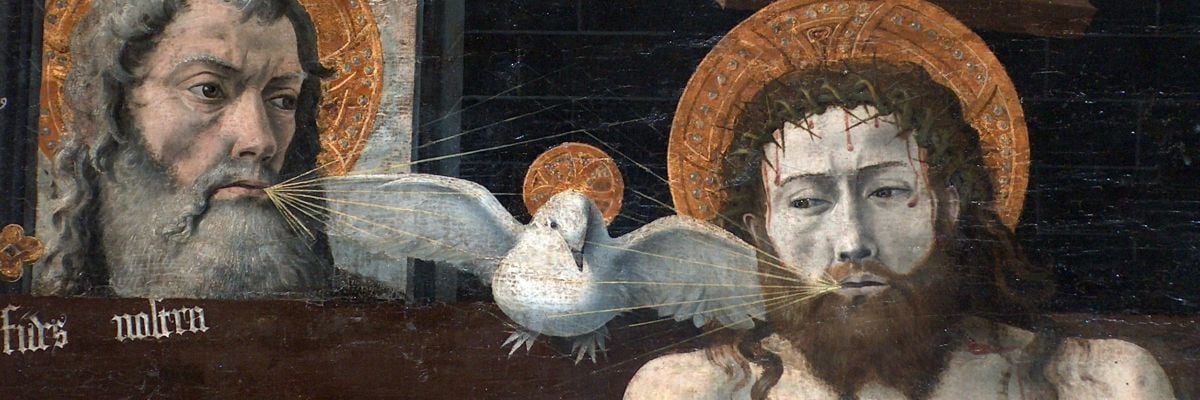
Catholic apologist Joe Heschmeyer joins Cy Kellett to tackle a thought-provoking question about the filioque controversy and its implications for the Creed and Church ecclesiology. Joe dives into the historical complexities surrounding the addition of “and the Son,” clarifying how early adaptations of the Nicene Creed reflect a richer context than many realize.
Transcript:
Cy: Paul, welcome. Why aren’t you Catholic?
Caller: Well, because I’m Orthodox, so it’s the second Orthodox-related call. What I see as a problem is the Filioque, okay. And the way it was added to the Creed after a previous Pope said he could not add it to the Creed because a council had given the Creed, and the Creed could only be changed by a council. So it affects not only the belief in the Holy Spirit’s procession, but also the ecclesiology of the Church.
Joe: Okay, so there’s two. Yeah, I think you’ve identified the two reasons one might object. One is the Filioque; even if it’s true, it shouldn’t have been added to the Creed unilaterally. This is actually a little bit more of a complicated history than I think most people realize, because the Nicene Creed is not actually given to us by the First Council of Nicaea. There is a baptismal formula used seemingly in or around Nicaea that becomes very influential. But you see several early adaptations. And so it’s actually the First Council of Constantinople that gives a modified form of the Nicene Creed.
So there’s good historical evidence from my recollection, and this is not an issue. I remember all of the history on that. Local churches were doing something like the Filioque before First Constantinople based on variations of the Nicene Creed that you’ll. In other words, it’s not as if the Pope just said, like I’m gonna add “and the Son”; rather, there were various forms of the Creed being used before Constantinople, and some of them continued to be used. I mean, we find other creeds being used.
So is the argument that we’re not allowed to use a Creed not given by the Council?
Caller: Well, I guess my main question would be, what do the Catholics mean by the Filioque? What do they mean? Do they mean there are two sources of the Holy Spirit?
Joe: No, absolutely not. I’m glad you asked that, because that’s really important. There is an important reunion called the Union of Brest, where this issue is clarified. What we mean is that the origin of, as it were, the Holy Spirit is the Father alone, but that the Father spirates or breathes the Spirit through the Son. So you don’t have two principles of origin, but there is a much clearer Trinitarian relationship from Father, Son to Spirit.
And it’s much clearer why we say the Second Person and the Third Person of the Trinity, whereas if you’re lacking a conception of that, then the relationship between the Son and the Spirit is ambiguous because all you can say is one proceeds by begetting and one proceeds by spiration. But since those terms mean very little, I think, to the ordinary Christian, why is one of them the second person and another is the third person of the Trinity? It feels arbitrary. It’s clear why the Father is the first person. He’s the origin of the Trinity. But it becomes less clear second versus third person.
So whether it was prudent or not to add the Filioque, I think Christians can reasonably disagree on that. There’s nothing heretical about praying the Creed without the Filioque. Even popes have done this in the past. And if you go to Eastern Catholic churches, you’ll find it prayed without the Filioque. But what the Filioque is expressing is both true and actually an important bit of Trinitarian theology that should be. I mean, maybe a council should do it to smooth everything over, but it should be something Christians recognize that there is this relation when Jesus breathes on the apostles. This is a reflection of something in the inner life of God that the Spirit proceeds through the Son.
Caller: Yes, I believe the Spirit proceeds from the Father through the Son. Even Seraphim of Sarov, a Russian monk, is quoted as saying that.
Joe: So the text of the Union of Brest says this: that when the Ruthenians come back to the Catholic Church, they should remain with what was handed down to us in the Holy Scriptures, in the Gospel, and in the writings of the holy Greek doctors, that is, that the Holy Spirit proceeds not from two sources and not by double procession, but from one origin, from the Father through the Son.
So I think in reality sound Eastern Orthodox and Eastern Catholic theologians agree it’s just a terminological dispute. And there is, you know, a lot of this was misunderstanding, especially as it got translated from Latin into Greek. And it sounded like it was saying that there were two origins or a double procession, and the Church clarified, “No, no, that’s not what we mean by that.”
Caller: Well, wasn’t it Thomas Aquinas that said the Father loves the Son and the Son loves the Father, and the love shared between the two is the Holy Spirit?
Joe: Well, the fruit is, it’s the fruit of the Father’s love then being given back to the Father through the Son, and the love is not itself the fruit of the love from the Father to the Son. So, understand, I mean, there’s different formulations, but what the Church at a magisterial level has said is that what we mean by the Filioque is the Father breathing the Spirit through the Son. And so if that’s something that you agree with, which it sounds like it is, well, then hopefully that won’t be an obstacle to your becoming Catholic.
Caller: Well, I think the Church should change the Creed to where it reads, “and the Holy Spirit, who proceeds from the Father through the Son,” not “from the Father and the Son.”
Joe: I’d be fine with that. I wonder if that would smooth feathers over or if it would ruffle feathers more by the fact that we’d be changing the Creed.
Caller: Well, I don’t know if everybody could get together and agree on it, but I think that’s a change that could be made in the problem.
Joe: Yeah, I mean, this is. If you read the canons of the Council of Florence, this was something where the Eastern Orthodox delegates, once they understood what Catholics meant by the Filioque, accepted it. And later they kind of changed that because of the influence of Mark of Ephesus. But originally, the delegates there, the Patriarch of Constantinople, the emperor, everybody virtually who went, agreed that, yeah, these terms are fine, we can accept this.
Cy: The music’s playing, Paul. That means we got to take a quick break. Thank you very much for the call. We have a book, if you’d like it. I think it lays out the Catholic side of many of the arguments.



